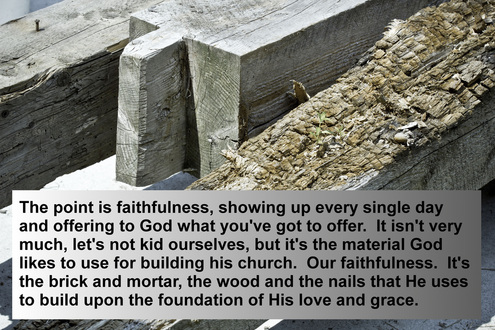In his July newsletter, Kevin Fitton shared some of his thoughts and experiences from planting a church in Vermont. As soon as we read his words, we wanted to post them here and Kevin graciously agreed. We pray you are encouraged and inspired as you faithfully remain in the place God has called you.
In any kind of ministry or non-profit work, it is difficult to gauge success. You can set out markers, but even when your ministry reaches those markers, there's always something in the back of your mind, saying Yeah,but. Yes, you may have reached a certain group of people; Your organization or church may have made a discernible impact on people's lives. Maybe you have even saved lives. That's success, right?
It is. But then there are the thousands and the hundreds of thousands that you didn't reach – people who remain completely unaware of the life and teachings of Jesus, people who are hungry, or homeless, or emotionally maimed by one of the many terrors in this world. Can you feel great about your “successes” when an infinite line-up of problems waits in the wings?
In general, I have tried to hold on to the successes that have come through St. Andrew's and Church at the Well. If we don't hold on to our successes, after all, it won't be long before we've given up. It is also a way of honoring God when we notice and remember the good things He has done through our ministries. But there still remains that question: is it enough? Does it matter?
Recently, I ran into another church planter, who had come to Vermont several years ago after planting a fast-growing church in a city in the northeastern US. I had met with him before he'd made the move to Vermont with his family and told him the same thing everyone else had: “This isn't going to be easy. It's not like other places in this country. People aren't going to be interested in your new church here in Vermont.” He had nodded, and then let the words go through one ear and out the other. I know, because that's what I did with all those pessimistic comments before Rebecca and I moved to Vermont – just let them wash away. It's the only way to handle it. If you really let it sink in, you'll just end up running. Church planters are just like entrepreneurs in that we have to be willing to ignore the statistics.
So here we were three years later, and he was telling me how difficult the process had been. He said, “You know, Church at the Well is the flagship church plant for the rest of us. You're the ones who made it.”
At first, I was surprised. You don't usually receive compliments from other pastors.
Then he said, “Can I ask you something? How did you do it? How did you make it to the point you're at now?”
Now I was really surprised. Compliments are rare, but sincere questions are like lightning strikes. It was an interesting question, too, because I don't usually think of our church as having made it. Certainly, we've come a long way, but we don't exactly blow the doors off with our attendance, and money's a continual challenge. Sometimes, the legs holding the thing up feel awfully wobbly.
But when I started speaking, I knew I had the right answer for his question. I said, “The reason our church made it is because we didn't leave. We could have left. Adam and Michelle could have left. There were times when it looked really bleak. But we're still here.”
Of course, there's a lot more to it than that. I could have given him a speech about how we built up our leadership team, the value of a clear mission statement, and a website to communicate that vision. I could have talked about the quality of our worship service, or the way Adam has built up our small groups program. But that would have missed the point. The point is faithfulness, showing up every single day and offering to God what you've got to offer. It isn't very much, let's not kid ourselves, but it's the material God likes to use for building his church. Our faithfulness. It's the brick and mortar, the wood and the nails that He uses to build upon the foundation of His love and grace.
It is. But then there are the thousands and the hundreds of thousands that you didn't reach – people who remain completely unaware of the life and teachings of Jesus, people who are hungry, or homeless, or emotionally maimed by one of the many terrors in this world. Can you feel great about your “successes” when an infinite line-up of problems waits in the wings?
In general, I have tried to hold on to the successes that have come through St. Andrew's and Church at the Well. If we don't hold on to our successes, after all, it won't be long before we've given up. It is also a way of honoring God when we notice and remember the good things He has done through our ministries. But there still remains that question: is it enough? Does it matter?
Recently, I ran into another church planter, who had come to Vermont several years ago after planting a fast-growing church in a city in the northeastern US. I had met with him before he'd made the move to Vermont with his family and told him the same thing everyone else had: “This isn't going to be easy. It's not like other places in this country. People aren't going to be interested in your new church here in Vermont.” He had nodded, and then let the words go through one ear and out the other. I know, because that's what I did with all those pessimistic comments before Rebecca and I moved to Vermont – just let them wash away. It's the only way to handle it. If you really let it sink in, you'll just end up running. Church planters are just like entrepreneurs in that we have to be willing to ignore the statistics.
So here we were three years later, and he was telling me how difficult the process had been. He said, “You know, Church at the Well is the flagship church plant for the rest of us. You're the ones who made it.”
At first, I was surprised. You don't usually receive compliments from other pastors.
Then he said, “Can I ask you something? How did you do it? How did you make it to the point you're at now?”
Now I was really surprised. Compliments are rare, but sincere questions are like lightning strikes. It was an interesting question, too, because I don't usually think of our church as having made it. Certainly, we've come a long way, but we don't exactly blow the doors off with our attendance, and money's a continual challenge. Sometimes, the legs holding the thing up feel awfully wobbly.
But when I started speaking, I knew I had the right answer for his question. I said, “The reason our church made it is because we didn't leave. We could have left. Adam and Michelle could have left. There were times when it looked really bleak. But we're still here.”
Of course, there's a lot more to it than that. I could have given him a speech about how we built up our leadership team, the value of a clear mission statement, and a website to communicate that vision. I could have talked about the quality of our worship service, or the way Adam has built up our small groups program. But that would have missed the point. The point is faithfulness, showing up every single day and offering to God what you've got to offer. It isn't very much, let's not kid ourselves, but it's the material God likes to use for building his church. Our faithfulness. It's the brick and mortar, the wood and the nails that He uses to build upon the foundation of His love and grace.

Which brings me back to the question of success. How do you know whether what you've been doing is enough? The only way to look at it, as far as I'm concerned, is through that lens of faithfulness. Did we show up every day? Did we trust God (or at least try to trust God)? Did we pray, and love, and serve?
We could have done better. I could have done better. I wasn't the most experienced pastor when we came to Vermont, and so I ended up learning a lot of stuff through trail and error. But one thing I can say with certainty; we're still here, asking that God would continue to bless this little ministry we call Church at the Well.
We could have done better. I could have done better. I wasn't the most experienced pastor when we came to Vermont, and so I ended up learning a lot of stuff through trail and error. But one thing I can say with certainty; we're still here, asking that God would continue to bless this little ministry we call Church at the Well.

Kevin Fitton is a graduate of Hope College and Gordon-Conwell Theological Seminary. He served as pastor of St. Andrew’s Christian Church for five years, before St. Andrew’s merged with Mosaic Burlington, creating Church at the Well. Kevin is also a freelance writer and is currently pursuing his MFA in Creative Writing from Bennington College. He lives in Ferrisburgh with his wife, Rebecca, and daughters, Naomi and Adelaide. Learn more about Church at the Well at www.wellchurchvt.com
 RSS Feed
RSS Feed
